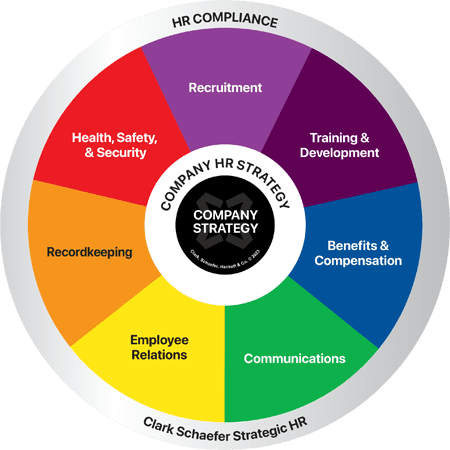Finding the Right HR Solution: PEO and Outsourced HR Pros and Cons
Last Updated on October 1, 2025 / HR Strategy
HR Question
As a growing employer, we are looking at options for human resources support. I have had a few colleagues recommend using an outsourced HR option, such as PEO, ASO, or HRO. What are those services and what things should I consider when trying to determine what is best for us?
HR Answer
As you scale, it is essential to have a robust HR system in place to manage payroll, benefits, compliance, and employee relations. Not all PEO, ASO, or HRO companies operate in the same way, so it is essential to understand the different options to choose the best fit for your organizational needs. Here is a brief summary of those types of HR services, including the pros and cons of each option, as you consider what is best for your situation.
What Is PEO (Professional Employer Organization)
A Professional Employer Organization is a comprehensive HR outsourcing solution where the PEO becomes a co-employer with your company. This means that you can offload many of your HR tasks while retaining control over the day-to-day management and operations. Examples of tasks that can be offloaded include:
- Payroll processing
- Benefit administration
- Compliance
- Onboarding and offboarding
The Advantages of a Professional Employer Organization
- PEOs ensure that your company follows employment laws and regulations, reducing the risk of legal issues, as they have a share in liability.
- PEOs often provide access to more health insurance, retirement, and workers’ compensation options due to their larger pool of employees, which can lead to cost savings and improved employee satisfaction.
- PEOs usually take over several administrative tasks, allowing you to focus on strategic business activities.
- PEOs handle payroll taxes and issue W2s to employees under the PEO’s Federal ID.
We see many organizations join a PEO for specific business needs. For example, a number of our clients join a PEO to obtain better group insurance rates, while others have done it to control their workers’ compensation costs.
Some Potential Cons to a PEO Arrangement Include the Following
- Loss of autonomy to make your own policy/procedure/benefit plans
- Employees are unclear about who their actual employer is.
- Perceived lack of responsiveness to your employee’s issues.
What is an Administrative Service Organization (ASO)
An Administrative Service Organization offers similar services to a PEO but without the co-employment arrangement. Your company retains full control over your employees, while the ASO handles administrative tasks such as payroll and benefits administration.
The Key Benefits of an Administrative Service Organization Include:
- Since there is no co-employment relationship, you have even greater flexibility in managing your workforce and making HR decisions.
- ASOs can be more cost-effective than PEOs because they offer à la carte services, allowing you to choose only what you need.
- ASOs can scale their services as your company grows, ensuring that you have the right level of support at every stage.
Some Potential Cons to an ASO Arrangement Include the Following:
- Unlike a PEO, there is no co-employment, so liability for HR issues remains with the employers.
- Employers do not have access to the group ratings for group insurance or workers’ compensation that a PEO allows.
- Most ASO groups focus on administrative work and are not strategic in nature for long-term strategy and growth models.
What Is HRO (Human Resource Outsourcing)?
Human Resource Outsourcing involves outsourcing specific HR functions or the entire HR department to an external provider. This option gives you the flexibility to choose which services to outsource, such as recruiting, employee training, or performance management. The key benefits of an HRO include:
- HRO allows you to tailor the HR services to fit your company’s precise needs and budget.
- HRO permits significant customization so you can outsource a very specific task or an entire function – your choice!
- HRO providers bring specialized knowledge and expertise to the table, which can enhance the effectiveness of your HR processes.
- By outsourcing non-core activities, you can concentrate on your primary business goals and growth strategies.
Disadvantages of Human Resource Outsourcing
- Cultural disconnect. Outsourced staff may not understand your company culture or values, making it difficult to provide culture-appropriate recommendations.
- Communication challenges. Coordinating between an outsourced group and internal employees and managers can sometimes be challenging.
- Less control over HR functions if you allow the outsourced company to use their own processes and systems.
Impact on Your Company
Regardless of which option you choose, engaging with a PEO, ASO, or HRO can have positive impacts on your organization:
- These providers ensure that your company stays compliant with labor laws and regulations, minimizing the risk of legal issues.
- Outsourcing HR functions frees up time and resources, allowing your team to focus on strategic initiatives and business growth.
- By leveraging the expertise and resources of these providers, you can potentially reduce costs associated with HR administration and employee benefits.
- These solutions can grow with your company, ensuring that you have the right level of HR support at every stage of your business development.
Ultimately, the choice between a Professional Employer Organization, Administrative Services Organization, or Human Resource Outsourcing will depend on your company’s specific needs, preferences, and budget. Each option offers unique advantages, and it may be beneficial to consult with potential providers to find the best fit for your organization.
Thank you to Paula Alexander, MA, PHR, SHRM-CP for her contribution to this article.
If you’re weighing the best HR support for your growing company, our HR Strategy services can help you evaluate your options and build a plan that fits. Contact us today.







